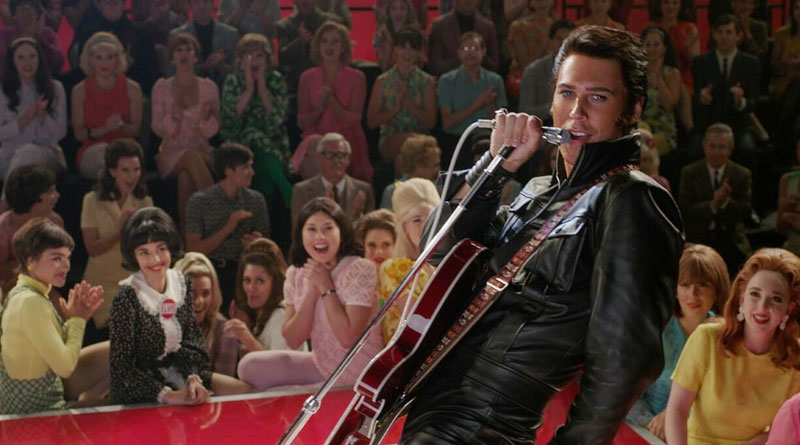Elvis (2022) Review
The idea of having Baz Lurhmann directing the Elvis Presley biopic seems like a perfect match, especially given the director’s signature razzmatazz style and the late king of rock-and-roll’s flamboyant on-stage persona.
The biopic — simply titled Elvis — is easily Lurhmann’s most ambitious project to date and the first thing that caught my attention is Austin Butler’s stunning performance in the title role. And it all begins from the moment he performs “Baby Let’s Play House” on stage all glammed up in a striking pink suit and sporting a slick, carefree coif hairstyle. He even does his own singing too when he plays young Elvis, even though his voice is subsequently integrated with Elvis’ during the later stage of his career. Butler may lack the uncanny resemblance to Elvis Presley (is it me or is he looking more like a young John Travolta?). But he still manages to nail his trademark velvety drawl, magnetic swagger and hip-swivelling moves.
Likewise, Luhrmann’s distinct visual style is on full display, employing every bag of tricks he can think of throughout the movie, and that includes his fast-paced camera movements and zooms. His energetic direction fits particularly well with Austin Butler’s exuberant style of singing-and-dancing performances on stage. The rest of the technical credits are equally top-notch, covering Mandy Walker’s vibrant cinematography to Catherine Martin and Karen Murphy’s opulent production design that captured the yesteryear era from the 1950s to the ’70s.

But the story — credited to Luhrmann alongside Sam Bromell, Craig Pearce and Jeremy Doner — is disappointingly a mixed bag. The first thing about the story that bothers me the most is Lurhmann’s odd decision to tell the illustrious life of Elvis Presley from the perspective of Colonel Tom Parker. The name in question refers to Elvis’ infamous manager played by Tom Hanks. It was supposed to be an inspired casting choice, given his calibre and all. But his incredibly peculiar accent makes me feel as if he’s showing up in a parody of how a Dutch manager would sound in English. His accent is so annoying that it’s such a missed opportunity, even though it’s worth commending Tom Hanks’ sneaky and manipulative role as well as his complete physical transformation.
It also doesn’t help when Luhrmann chooses to play safe using the typical biopic formula. It’s more like experiencing a visual walkthrough of a Wikipedia page chronicling the life of Elvis Presley from his childhood era to the rise and fall of his short-lived career before his tragic death at the age of 42.
Grim moments of history that supposedly affected Elvis during the tumultuous 1960s era of America including the assassinations of Martin Luther King Jr. and later, Robert F. Kennedy are mentioned but glossed over. The movie did include Elvis’ love life with Priscilla Presley (Olivia DeJonge in a thankless role) is just as superficially told. In other words, it’s all surface-level storytelling here that I wish Luhrmann could have dug deeper to explore Elvis Presley beyond what (most of us) already know about his life.

Still, it’s not all doom and gloom on the storytelling front, where Luhrmann does make an effort during the second half of the movie to delve into Elvis’ later life, who becomes increasingly vulnerable and feels trapped like a prized bird in the golden cage of International Hotel in Las Vegas. From here, we start to see Elvis turns paranoid and even addicted to popping pills. Luhrmann also brings out the best in Butler’s already-engaging performance as the young Elvis in the first half but it was the part, where he plays the older and emotionally wrecked Elvis that seals the deal. The kind that probably sees him as one of the strong contenders to land an Oscar nomination in the Best Actor category.
While not quite the definitive Elvis Presley biopic that I would hope for, the movie remains a wild ride, thanks largely to Baz Luhrmann and Austin Butler’s respective offscreen and onscreen contributions.





